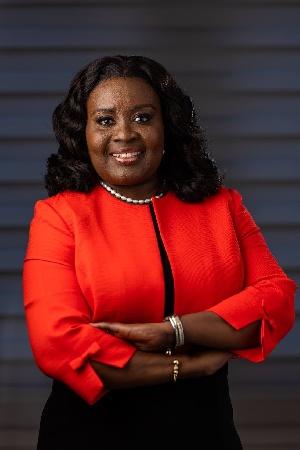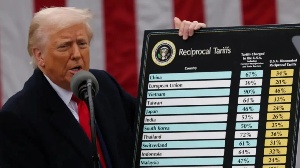- Home - News
- Elections 2024
- News Archive
- Crime & Punishment
- Politics
- Regional
- Editorial
- Health
- Ghanaians Abroad
- Tabloid
- Africa
- Religion
- Photo Archives
- Press Release
General News of Monday, 7 April 2025
Source: www.ghanawebbers.com
Defiant Trump and officials vow to stay course as countries scramble over tariffs
US President Donald Trump and his advisers are defending new tariffs on imports. They plan to continue these tariffs despite market turmoil and concerns about a trade war.
In several TV interviews, Treasury Secretary Scott Bessent downplayed recent stock market declines. Commerce Secretary Howard Lutnick insisted that reciprocal tariffs will be implemented as planned.
Bessent stated there is "no reason" to expect a recession from this situation. He described it as an "adjustment process."
Kevin Hassett, another adviser, mentioned that over 50 countries have contacted Trump for negotiations.
On Friday, all three major US stock indexes fell more than 5%. The S&P 500 dropped nearly 6%, marking the worst week since 2020.
Market instability may continue this week. Saudi Arabia's stock exchange ended nearly 7% lower, its largest daily loss since the pandemic began.
JP Morgan predicts a 60% chance of a US and global recession due to Trump's tariffs announcement.
Speaking to reporters on Air Force One, Trump said European and Asian countries want to make deals. He dismissed concerns about American consumers' pain threshold amid fears of rising prices.
"I think your question is so stupid," he told one reporter. "I don't want anything to go down. But sometimes you need medicine to fix something."
Lutnick told CBS News that the new 10% tariff on all imports will remain in place for days and weeks. He confirmed that steeper reciprocal tariffs are still planned.
Higher customs tariffs on around 60 countries will take effect on April 9. Lutnick assured that these tariffs were coming as announced by Trump.
He also defended tariffs imposed on two tiny Antarctic islands populated only by penguins, stating it was necessary to close loopholes for countries like China.
Bessent argued on NBC's Meet the Press that Trump has created "maximum leverage." More than 50 countries have approached the administration about lowering trade barriers and stopping currency manipulation.
Hassett reiterated that over 50 countries want negotiations but did not specify which ones had reached out.
Indonesia and Taiwan announced they would not impose retaliatory tariffs after the US set a 32% levy on their imports.
Vietnam's leader requested Trump delay a proposed 46% duty on Vietnamese exports by at least 45 days, according to reports from AFP and The New York Times.
Meanwhile, China announced it would impose a 34% tariff on all US imports starting April 10.
UK Prime Minister Sir Keir Starmer warned that "the world as we knew it has gone." He emphasized the UK government's desire for an economic deal with the US that avoids some tariffs.
A Downing Street spokesman noted Starmer spoke with Canadian Prime Minister Mark Carney about avoiding an all-out trade war being in no one's interest.
On Monday, Israeli Prime Minister Benjamin Netanyahu is expected to meet Trump for trade talks in Washington DC. Netanyahu stated he is the first international leader meeting with Trump since the new tariffs were introduced, highlighting their strong connection during this time.
Anti-Trump protests occurred in many US cities over the weekend, marking significant opposition since he took office in January. Hundreds of thousands protested in cities like Boston, Chicago, Los Angeles, New York, and Washington DC against various aspects of Trump's agenda.
Trump urged Americans to "hang tough" following market turmoil.
Business










